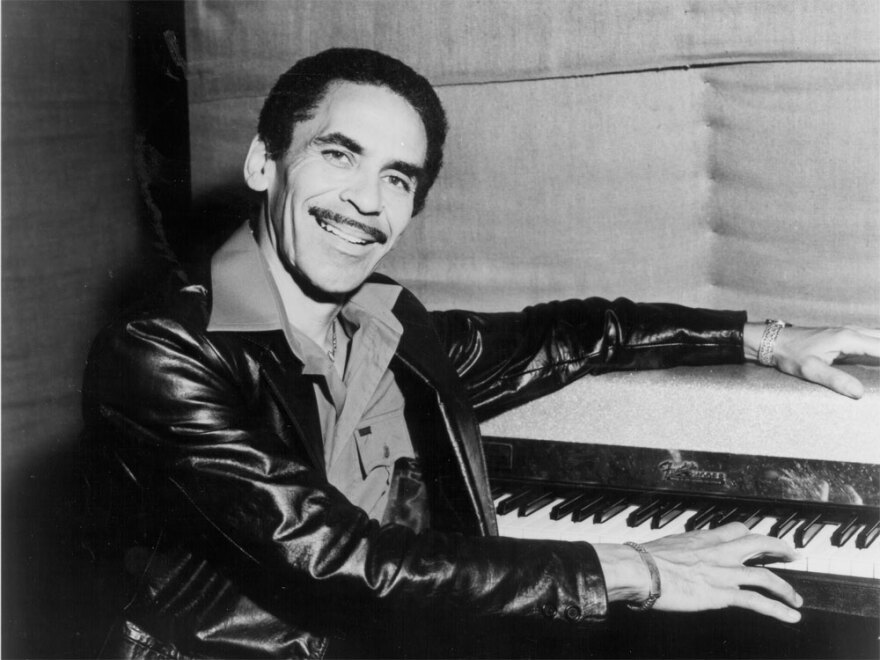With our free press under threat and federal funding for public media gone, your support matters more than ever. Help keep the LAist newsroom strong, become a monthly member or increase your support today.
Memphis Soul Pioneer Willie Mitchell Dies At 81

Music producer Willie Mitchell died Tuesday at age 81. Though you may not know him by name, you certainly know his work: Mitchell was the producer behind a string of hits by Al Green in the early to mid-1970s — just part of an expansive body of work that began in the 1950s and extended into the 21st century.
Mitchell's story is one of a musician who stayed true to his roots, both cultural and musical, and spun gold from those beginnings. Born in Mississippi but raised in Memphis, Mitchell help to establish his city as the soul-music capital of the south. He started as a trumpeter and had a few regional hits before moving from the bandstand to the mixing board in 1960. He soon began producing sessions for vocalists O.V. Wright, Lee Rogers and Ann Peebles.
His first sessions for Hi Records were recorded at a movie house turned recording studio, Royal Studios. From then on, he never worked anywhere else.
'Let The Song Happen'
In 1970, Mitchell bought Royal Studios and established a session band with the best Memphis R&B musicians. At around the same time, he booked time in Royal for a young soul singer named Albert Greene. In a little more than two years, Mitchell and the newly minted Al Green produced seven singles, which each sold more than 1 million copies.
In an interview with NPR in 2000, Green and Mitchell pulled back the curtain on the latter's skills as a producer for the 1972 hit "Let's Stay Together."
"I'm in here, trying to blow the studio top off," Green said, "and Willie kept saying, 'No, just say it.' I'm going, like, 'I think I need to just muscle up and sing it.' He said, 'Don't try to handle the song, Al. Just let the song happen. Just let it happen. Just let it ooze out and let it — that's right.' "
"I wanted this golden voice on it, and he kept giving me somebody else's voice," Mitchell said. "And that's why we just kept going over and over and over and over again. Yeah. When he nailed it, I said, 'That's the one.' "
The Mitchell Magic
The two parted ways in 1976, but Royal Studios stayed busy with Mitchell productions. By the 1980s, the Green-Mitchell collaborations had become influential, and other musicians started to make their way to Memphis, hoping for some of the Mitchell Magic.
"If you walk into that room, it's like a circus tent," says Andria Lisle, a Memphis-based freelance journalist who visited the studio many times. "It's covered in burlap that drapes down from the walls. It's sloped, because it was a movie studio, and you've got the vocal booth. You've got Al's mic, the mic that Al Green recorded his greatest stuff on in the 1970s."
John Mayer, Rod Stewart and Keith Richards all made their way to Memphis, Royal Studios and Willie Mitchell. By 1989, even Green made his way back.
"Memphis was just as much a part of the Mitchell sound as any piece of equipment in Royal Studios," Lisle says. "Willie knew the magic was Memphis, and he didn't need to go anywhere else. Everybody came to him."
If future generations of musicians make the trek to record in Royal Studios, there'll be an instant reminder of Mitchell's legacy. In 2004, the name of the street along that section of south Memphis was changed to Willie Mitchell Blvd.
Copyright 2022 NPR. To see more, visit https://www.npr.org. 9(MDA1OTI3MjQ5MDEyODUwMTE2MzM1YzNmZA004))
At LAist, we believe in journalism without censorship and the right of a free press to speak truth to those in power. Our hard-hitting watchdog reporting on local government, climate, and the ongoing housing and homelessness crisis is trustworthy, independent and freely accessible to everyone thanks to the support of readers like you.
But the game has changed: Congress voted to eliminate funding for public media across the country. Here at LAist that means a loss of $1.7 million in our budget every year. We want to assure you that despite growing threats to free press and free speech, LAist will remain a voice you know and trust. Speaking frankly, the amount of reader support we receive will help determine how strong of a newsroom we are going forward to cover the important news in our community.
We’re asking you to stand up for independent reporting that will not be silenced. With more individuals like you supporting this public service, we can continue to provide essential coverage for Southern Californians that you can’t find anywhere else. Become a monthly member today to help sustain this mission.
Thank you for your generous support and belief in the value of independent news.

-
What do stairs have to do with California’s housing crisis? More than you might think, says this Culver City councilmember.
-
Yes, it's controversial, but let me explain.
-
Doctors say administrator directives allow immigration agents to interfere in medical decisions and compromise medical care.
-
The Palisades Fire erupted on Jan. 7 and went on to kill 12 people and destroy more than 6,800 homes and buildings.
-
People moving to Los Angeles are regularly baffled by the region’s refrigerator-less apartments. They’ll soon be a thing of the past.
-
Experts say students shouldn't readily forgo federal aid. But a California-only program may be a good alternative in some cases.







